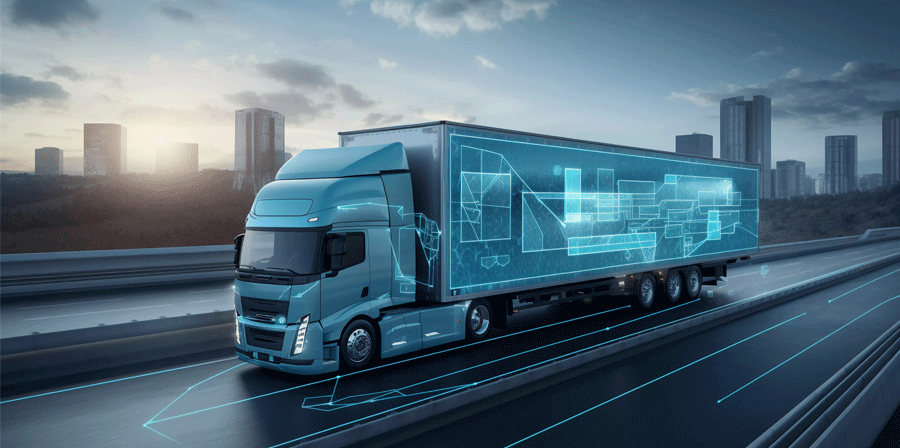AI in Freight Transportation and Supply Chain
The freight transportation and supply chain industry is undergoing a significant transformation.
This change is driven by the integration of Artificial Intelligence (AI).
AI is not just a buzzword in this sector. It's a powerful tool that's reshaping operations, enhancing efficiency, and reducing costs.
From lane routing and freight brokerage to warehouse management, AI is making a difference. It's enabling smarter decision-making and streamlining processes.
In this article, we delve into the transformative effects of AI in the freight transportation and supply chain industry. We'll explore how AI is revolutionizing various aspects of the industry, providing insights for professionals and enthusiasts alike.
Join us as we navigate the digital supply chain, powered by AI technology.
Revolutionizing Lane Routing with AI
Lane routing is a critical aspect of freight transportation. It determines the path that freight takes from origin to destination.
AI is revolutionizing this process. It's enabling more efficient and cost-effective routing decisions.
By analyzing vast amounts of data, AI can predict traffic patterns and identify optimal routes. This reduces fuel consumption and delivery times, leading to significant cost savings.
In essence, AI is transforming lane routing from a complex puzzle into a manageable task. It's making freight transportation more efficient and sustainable.
AI-Driven Freight Brokerage: Efficiency and Speed
Freight brokerage is a key link in the supply chain. It involves matching shippers with carriers, a process that can be time-consuming and inefficient.
Enter AI. AI-powered freight brokerage platforms are changing the game. They use machine learning algorithms to match shippers with carriers quickly and accurately.
This not only speeds up the process but also ensures a better match. The result is a more efficient supply chain, with goods reaching their destination faster and at a lower cost.
In short, AI is making freight brokerage smarter, faster, and more efficient. It's another example of how AI is transforming the freight transportation and supply chain industry.
Enhancing Trucking Capacity with Predictive Analytics
Trucking capacity is a critical factor in freight transportation. Underutilization of trucks can lead to increased costs and inefficiencies.
AI comes into play here. Predictive analytics, powered by AI, can forecast demand and optimize trucking capacity. This means trucks are filled to their optimal capacity, reducing empty runs and wasted space.
Moreover, AI can predict maintenance needs, reducing downtime and further enhancing capacity utilization. This leads to cost savings and a more efficient supply chain.
In essence, AI is enabling smarter, data-driven decisions in trucking capacity management. It's another way AI is revolutionizing the freight transportation and supply chain industry.
Leveraging Intermodal Freight through AI
Intermodal freight, the use of multiple modes of transportation, is a complex process. It involves coordinating schedules, routes, and costs across different transport modes.
AI can simplify this process. It can analyze vast amounts of data to identify the most efficient and cost-effective combinations of transport modes. This leads to more sustainable and cost-effective transportation solutions.
Moreover, AI can predict and manage potential disruptions in intermodal freight. This ensures smooth transitions between different modes of transport, reducing delays and costs.
In conclusion, AI is a powerful tool for leveraging intermodal freight. It's another example of how AI is transforming the freight transportation and supply chain industry.
The Role of AI in Freight Consolidation
Freight consolidation is a key strategy in logistics. It involves combining smaller shipments into a larger one to maximize load efficiency.
AI plays a crucial role in this process. It can analyze shipment data to identify opportunities for consolidation. This minimizes shipping costs and reduces the carbon footprint.
Moreover, AI can predict the best times for consolidation. It takes into account factors like demand patterns, delivery schedules, and carrier availability. This ensures timely and efficient deliveries.
In conclusion, AI is a game-changer in freight consolidation. It not only reduces costs but also contributes to environmental sustainability.
Cost Reductions via AI Automation and Predictive Maintenance
AI is a powerful tool for cost reduction in the freight transportation and supply chain industry. One way it achieves this is through automation.
AI can automate routine tasks, freeing up human workers for more strategic activities. This not only reduces labor costs but also enhances productivity and efficiency.
Another way AI reduces costs is through predictive maintenance. AI systems can analyze equipment data to predict potential failures. This allows for proactive maintenance, preventing costly breakdowns and downtime.
In essence, AI is a valuable ally in cost management. It streamlines operations and ensures optimal use of resources, leading to significant savings.
Streamlining Cross-Docking Operations with AI
Cross-docking is a key process in logistics. It involves transferring goods directly from incoming to outgoing transport, minimizing warehouse storage. AI can streamline this process.
AI systems can coordinate the timing of incoming and outgoing shipments. This reduces the time goods spend in the warehouse, enhancing efficiency.
Moreover, AI can predict the best routes for moving goods within the warehouse. This reduces handling times and improves the speed of cross-docking operations.
In conclusion, AI is transforming cross-docking. It's making the process faster and more efficient, contributing to improved logistics performance.
Achieving Warehouse Fluidity with AI Predictive Systems
Warehouse fluidity is crucial for efficient logistics operations. It involves the smooth flow of goods in and out of the warehouse. AI predictive systems can enhance this fluidity.
AI can predict and manage inventory levels. It uses historical data and real-time information to forecast demand. This helps in maintaining optimal inventory levels.
Moreover, AI can identify patterns in order flow. It can predict peak times and prepare the warehouse accordingly. This ensures a smooth flow of goods even during busy periods.
In conclusion, AI predictive systems are enhancing warehouse fluidity. They are ensuring a smooth flow of goods, contributing to efficient logistics operations.
AI in Warehouse Management: Space Utilization and Inventory Accuracy
Warehouse management is a critical aspect of supply chain operations. It involves the efficient use of space and accurate tracking of inventory. AI is playing a transformative role in this area.
AI systems can optimize warehouse layout for better space utilization. They analyze the size, weight, and frequency of items to determine optimal placement. This leads to efficient use of space and faster picking times.
Moreover, AI enhances inventory accuracy. It uses machine learning algorithms to predict demand and manage stock levels. This reduces the risk of overstocking or stockouts.
In conclusion, AI is revolutionizing warehouse management. It is improving space utilization and inventory accuracy, leading to more efficient and cost-effective operations.
Smart Logistics: Real-Time Tracking and Improved Customer Service
Smart logistics is another area where AI is making a significant impact. It involves the use of AI technology to enhance logistics operations, particularly in real-time tracking and customer service.
AI-powered tracking systems provide real-time visibility of shipments. This allows for better planning and timely response to any disruptions. It also improves the accuracy of estimated delivery times, enhancing customer satisfaction.
In terms of customer service, AI chatbots and virtual assistants are being used to handle customer queries and complaints. They provide quick and accurate responses, improving the overall customer experience.
In essence, AI is transforming logistics operations. It is enabling real-time tracking and improving customer service, contributing to more efficient and customer-centric logistics.
AI Optimization in Last Mile Delivery
The last mile delivery is a critical aspect of the supply chain. It involves the movement of goods from a transportation hub to the final delivery destination. AI plays a significant role in optimizing this process.
AI technology is used to plan the most efficient routes for delivery. It takes into account various factors such as traffic conditions, weather, and delivery windows. This results in timely and cost-effective deliveries.
AI also facilitates dynamic pricing in last mile delivery. It considers factors like demand, distance, and delivery speed to determine the optimal price. This helps in maximizing profitability while ensuring customer satisfaction.
In conclusion, AI is revolutionizing last mile delivery. It is enhancing efficiency, reducing costs, and improving customer service.
The Impact of AI on Warehousing and Fulfillment Services
Warehousing and fulfillment services are integral parts of the supply chain. AI is transforming these areas in significant ways.
AI-driven robots and automated guided vehicles (AGVs) are making warehousing operations more efficient. They handle tasks such as picking, packing, and sorting, reducing human error and increasing productivity.
In fulfillment services, AI enhances demand forecasting. This leads to better stock management and reduces instances of overstocking and stockouts.
In summary, AI is making warehousing and fulfillment services more efficient and accurate. It's reducing costs, improving productivity, and enhancing customer satisfaction.
Conclusion: Embracing AI for a Competitive Edge in Freight Transportation
The transformative power of AI in the freight transportation and supply chain industry is undeniable. It's revolutionizing operations, enhancing efficiency, and reducing costs. From lane routing to warehouse management, AI is making a significant impact by enabling smarter decision-making, improving customer service, and driving sustainability.
With all these advantages, it's crucial to move forward with a trusted logistics and warehousing partner who can guide you in the right direction. This is where Jillamy comes in. Jillamy is here to help you navigate the future of AI integration, offering expertise and support to ensure you maximize the benefits for your company.
Embracing AI is no longer an option but a necessity for businesses in this industry. It's the key to gaining a competitive edge, adapting to market changes, and meeting customer expectations. AI is the future of freight transportation and the supply chain industry. It's time for businesses to leverage this technology and reap its benefits.
Jillamy is your go-to solution for optimizing operations in the freight transportation and supply chain industry. From revolutionizing lane routing and freight brokerage to enhancing trucking capacity and streamlining last mile delivery, Jillamy offers comprehensive solutions tailored to meet your specific needs. Our cutting-edge systems provide real-time insights, streamline operations, and drive cost efficiencies, ensuring your business stays ahead of the competition.
For more information on how Jillamy can transform your logistics operations, please contact us a or visit our website at www.jillamy.com. Let us partner with you to unlock the full potential of technology in your freight transportation and supply chain endeavors. Embrace innovation with Jillamy and experience transformative solutions in every aspect of your operations.




